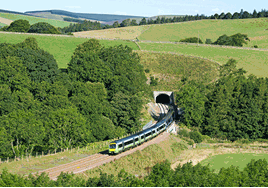Download the diagram from this feature.
Britain’s urban areas outside London are at varying stages of major changes to the way transport is prioritised and managed, which presents both challenges and opportunities for the rail industry. The reasons why handing powers to cities, regions and countries has become a major theme of the early 21st century is encapsulated by the view of Richard de Cani, Managing Director of Planning at Transport for London: “Passengers in other parts of the country too often face fragmented services, confusing ticket structures and a network that simply does not join up. That’s why the push to devolve powers to cities is so important.” All major cities are focusing on how to create that virtuous circle of growth through transport and other enablers so that they can develop dynamic and attractive environments.
How devolution might improve transport has been a theme rising up national and regional agendas since powers over Scottish railways were transferred from the Department for Transport to the Scottish Executive in 2005.
Transport is not only seen as a prime driver of growth and prosperity, there has also been a recognition that widespread investment in transport benefits the whole country, and isn’t a zero-sum game. This has encouraged a regional outlook, seeing benefits in planning as an agglomeration.
A recent report by the Smith Institute for PwC (Full Speed Ahead: connecting our cities and regions, June 2015) suggested that the key to improving connectivity centred on sustained investment and improving collaboration. Both can be addressed by giving greater power to national (in the case of Wales and Scotland) and regional bodies.
The UK’s poor productivity is seen as another compelling reason for devolving transport powers. Workers in the UK produce on average 30% less per hour than workers in Germany, the US and France - we even produce 10% less than the average Italian. Poor infrastructure is cited as one reason - as a report by the think tank Policy Exchange (On the Move: How to create a more mobile workforce, August 2015) says: “Making it easier for people - especially those on low incomes - to commute a further 20 minutes each way would put them within touch of two or more major employment sites, and potentially 10,000 more jobs.”
Much of the central pressure for devolution is coming from Chancellor George Osborne and the Treasury. In the wake of Greater Manchester’s ground-breaking devolution deal signed in November 2014, an invitation for other proposals produced 38 responses from cities, towns and counties, ranging from Cornwall and Dorset to the Tees Valley and Cumbria. Future deals will be supported through the Cities and Local Governments Devolution Bill, which received Royal Assent in January.
The extent to which powers might be devolved is likely to vary, with each having a bespoke arrangement. Agreements to devolve transport powers are already under way for Sheffield City Region Combined Authority, West Yorkshire, Cornwall and the West Midlands. And the individual character of devolution can be clearly seen in the bodies that already exercise delegated transport powers - Scotland, Wales and London.
Scotland is both the franchising authority and the funding specifier for Network Rail. Besides being a substantial owner and operator of transport, Transport for London is also the franchising authority for London Overground routes (although it does not specify Network Rail spending). And though Wales is not yet the franchising authority, the Welsh Assembly Government has funded significant rail infrastructure improvements such as the re-opening of the Vale of Glamorgan Line.
In northern England, Transport for the North (TfN) will gain statutory powers before the end of 2016, and Rail North will become part of TfN as its franchising arm and joint manager (with the DfT) of the Arriva Rail North and TransPennine Express franchises from April 1 2016.
Although there is no rigid template for devolution, it is most likely to improve transport when responsibility is devolved to a significant, coherent and contiguous body, argues Transport Scotland Commercial Director Bill Reeve.
“Where you devolve responsibility in that way, it raises the profile of transport and causes politicians to be willing to make commitments on transport and reallocate resources to reflect them. It also allows decision-making to reflect local priorities and understanding rather than be hidebound by centralised evaluation criteria,” he says.
“A powerful illustration of this was the long list of schemes which the Strategic Rail Authority had to choose priorities from, many of which had not a hope and had to be cut. One of them was the Borders Railway - it came nowhere near the top of the appraisal list of transport projects, being expensive and offering a low return in railway investment terms. But in Scotland it was understood as a wider economic project, intended to rejuvenate the Borders and Midlothian economy, and devolution allowed us to take a different perspective on the rationale for investment.”












